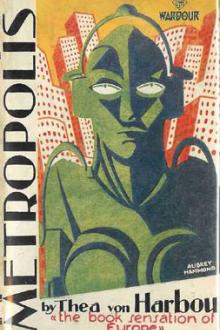Metropolis
Book Excerpt
"To-night," he said, "I shall be with you. I shall be entirely enwrapped by you. I shall pour out my life into you and shall fathom whether or not I can bring you to life. I shall, perhaps, feel your throb and the commencement of movement in your controlled body. I shall, perhaps, feel the giddiness with which you throw yourself out into your boundless element, carrying me-me, the man who made-through the huge sea of midnight. The seven stars will be above us and the sad beauty of the moon. Mount Everest will remain, a hill, below us. You shall carry me and I shall know: You carry me as high as I wish..."
He stopped, closing his eyes. The shudder which ran through him was imparted, a thrill, to the silent machine.
"But perhaps," he continued, without raising his voice, "perhaps you notice, you, my beloved creation, that you are no longer my only love. Nothing on earth is more vengeful than the jealousy of a machine which believes it
Editor's choice
(view all)Popular books in Science Fiction, Fiction and Literature
Readers reviews
- Upvote (0)
- Downvote (0)
The fault with the e-book is the numerous transcription errors, hun for him, aback for a back, etc. The errors drop puzzles in the middle of a nicely flowing story.
A despot rules the city a thousand years in the future, controlling the machines and peons that operate the city for the benefit of the ruling rich (it's fiction--pretend such a thing could happen.) The despot's son rebels against his father and disappears among the workers, finding love.
The characterizations are very good, and the plotting circuitous. It is quite sympathetic to the common man, but recognizes his ability to riot. Oddly, she admired the Nazis.
I was disappointed to see characters die, then turn out to be okay after all. It happened four or five times.
A very different sci-fi novel, still a good commentary today.
The print verion of Metropolis with the Kaluta illistrations is hard to find. But Mike put the illustrations online on his website, at http://www.kaluta.com/pages/metropolis/metbook.html
I created a custom Mobipocket ebook version with the illustrations starting with the HTML version here.
I've read the book a number of times over the years, and get a different take each time. In part, these days, I see it as a story of redemption.
Yoh Frederson is Master of Metropolis. His beloved wife Hel died giving birth to his son Eric. Yoh has sealed himself off from feelings since, seeking to become a precise, efficient machine like those that power his city. Machines don't feel. Machines don't hurt. In the process, he has divorced himself from empathy and the ability to understand the plight of the workers who keep things going.
His chief scientist, Rotwang, has created a robot that can replace the fallible workers. Rotwang too loved Hel, and was a rival for her affections before she married Yoh, so the relationship between the men is complex.
Eric becomes involved with Maria, daughter of a worker and leader of a worker religious sect, and discovers the worker's plight and resolves to help, setting in motion the events of the film.
See the film. Read the book. They complement and illuminate each other.
I recommend the print version put out about 20 years ago with gorgeous illustrations by Wm. Michael Kaluta, a marvelous artist with a fine fix on the Art Deco aesthetic, who is best known in comic circles as an artist on latter day versions of The Shadow. Those visuals will complete the experience of watching a lost cut of the original.
It really is an utopian vision, but unfortunately von Harbou did not see it that way. Still, it made one hell of a movie and it is a marvelous read.

 Free Download
Free Download





















